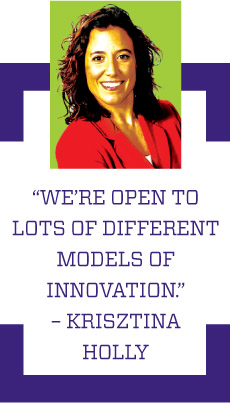The ‘Z’ Factor
A start-up veteran guides researchers’ adventures in entrepreneurship.

Whether surfing, backcountry skiing, hurtling down Los Angeles mountainsides on a bicycle, or launching a start-up, Krisztina “Z” Holly gets her kicks from taking risks. Now, having experienced the rewards of entrepreneurship, she wants university researchers to share the same thrill.
Holly, or “Z” as she prefers to be called, is the founding executive director of the University of Southern California’s Stevens Institute for Innovation, a one-stop shop for grad students, undergrads, and faculty looking to bridge the challenge-filled gap between research lab and the commercial world. “We’re open to lots of different models of innovation, whether it’s open source and public domain, to patenting and licensing…[or] helping start a company,” says Holly.
Conceived within the Viterbi School of Engineering in 2006 and backed by a gift from venture capitalist Mark Stevens, a USC alumnus, the institute has since been moved to the provost’s office and serves the whole campus. It assists individuals and teams with a variety of approaches to prevent prototypes with market potential from languishing. In the Ideas Empowered program, for instance, faculty-led invention teams are paired with industry mentors as well as M.B.A. students in an intensive, four-month boot camp for burgeoning technologies. Roughly 10 of some 40 applicant teams are chosen to participate in the program, with about six of the selected groups ultimately receiving funding based on their final feasibility presentations. Since 2010, when Ideas Empowered began, winning teams have garnered close to $1 million in seed money.
Holly brings an inspiring background to the task. “From a young age, I always thought one day I’d be an entrepreneur,” Holly recalls. She credits her parents, both refugees who left Hungary in 1956, with instilling her risk-taking spirit. Her father, who arrived in the United States penniless and unable to speak English, now holds degrees from Harvard and MIT, as well as close to 60 patents for a variety of inventions. “It’s sort of the epitome of the American dream,” Holly says.
While working on her master’s degree in mechanical engineering at MIT and designing robotic systems for NASA, she and two fellow students founded Stylus Innovation, a company that created Visual Voice computer-based telephony tools. In 1996, Artisoft acquired Stylus for $13 million. Holly branched out to produce educational documentaries related to science, math, and business with River Run Media, but soon joined a Web search engine start-up called Direct Hit Technologies. In 2000, the firm was bought by Ask Jeeves in a deal valued at $506 million.
Holly’s next move was to cofound MIT’s Deshpande Center for Technological Innovation in 2002, a start-up incubator that has since launched 26 new companies, which together have raised more than $350 million in venture capital. In 2007, she became USC’s innovation guru. “It’s definitely a dream job,” she says, “in the sense that it pulls together all these things I am really passionate about,” namely promoting entrepreneurship, developing cutting-edge technologies, and helping people achieve their aspirations.
Holly’s position as a facilitator of ideas has made her a strong advocate for governmental support of entrepreneurship within colleges and universities. In the fall of 2009, she proposed a $100 million, five-year plan to fund 10 university pilot projects aimed at translating research into products and creating “innovation ecosystems.” The Obama administration embraced the idea, incorporating variations of it into budgets for the National Science Foundation and the Departments of Energy and Commerce.
Universities are much more supportive of entrepreneurship than in the past, Holly says. She recalls that when she attended MIT in the early 1990s, administrative red tape kept engineering students from taking business-school classes. Now “those walls are starting to come down,” she says. At USC, a growing number of students in various majors are taking classes at the Marshall School of Business and entering invention competitions. Still, she says, more schools could benefit from institutes like hers. “I definitely think that it would be really viable for every university to have some sort of a resource for faculty and students who are interested in entrepreneurship.” Who knows how many untapped potential start-ups could be hiding in your school’s labs?
Alison Buki is an ASEE staff writer.
Category: Up Close